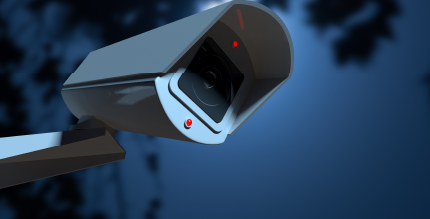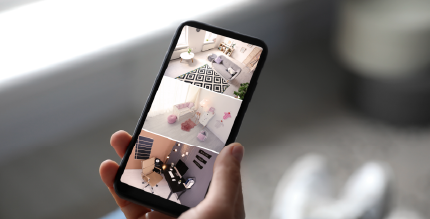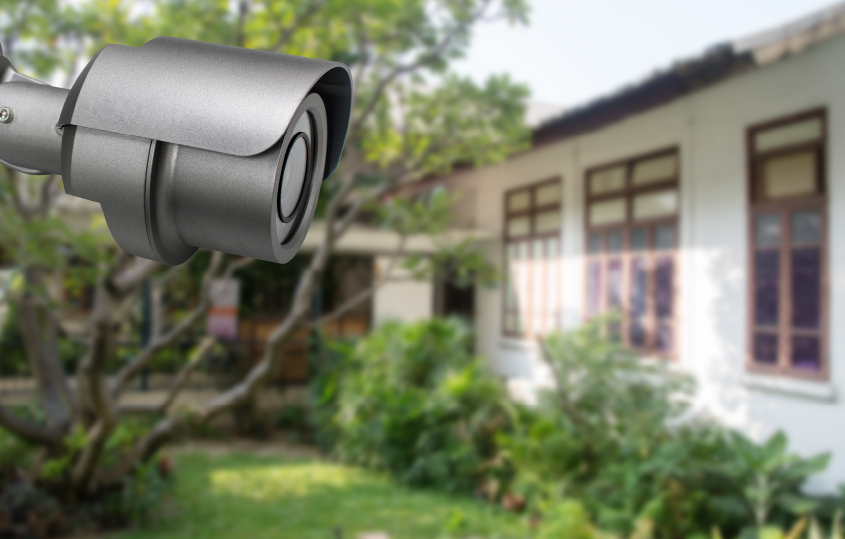Home is where you should feel safest, and security cameras are a valuable addition to protect your loved ones. Similarly, a business is a big investment, and you need to protect your livelihood, employees, and customers. However, there are so many options to choose from, and finding out where to get started can quickly get confusing.
Mesa Alarms has been in the residential and commercial security industry for over 30 years. This blog shares our expertise on how to select security cameras to fit your needs best.
Security Cameras for Home vs. Business
There will be a lot of qualities in a security camera that will apply to home and business protection, but there are also some clear distinctions between the two.
Commercial security cameras need high-quality footage to monitor customers and employees. Some often need specific abilities like capturing license plates or Pan-Tilt-Zoom (PTZ) cameras, which allow an operator to remotely control the camera. Business security cameras also have different manufacturer standards than home security cameras for longevity and reliability.
Businesses will have more security cameras than an average home because they need to monitor all entries, hallways, aisles, registers, parking lots, etc. The multiple cameras require a huge amount of storage, but thankfully to business owners, many can configure their footage storage to a central server that’s remotely accessible.
Commercial cameras typically need more security features, such as being physically more indestructible in the case of robberies and including trigger alerts for monitoring stations. These cameras also need to have more advanced security against hacking because business owners have to protect their employees and customers.
Now that we have established the difference between home and business security cameras, we can move on to some of the features both may want to consider before choosing a security camera.

Types of Cameras
Wired vs. Wireless
Wired cameras are plugged in or hardwired into a home to power the device. The advantage is that you never have to worry about having the right batteries and replacing them. However, depending on your preferences, it could add to a jumble of wires you already have, and they can shut down when the house’s power goes out.
Wireless cameras are easy to install and utilize batteries that should last at least a year. Some batteries in wireless cameras are even rechargeable! Outdoor cameras are usually wireless, and some are starting to use solar power, so batteries never need to be changed.
WiFi-Connect vs. Analog
A WiFi-connected camera, also known as a digital or IP camera, has a corresponding app to access livestream footage, receive activity notifications, and remotely control the camera. With this setup, it opened up professional monitoring services from local sources and beyond because you and a monitoring station can remotely check in to your footage from anywhere in the world as long as you’re connected to WiFi.
Analog cameras don’t livestream footage capabilities, but they’re a great solution if you don’t have WiFi. A micro-SD card or hard drive will typically keep the records stored, and footage can be viewed after downloading onto a computer or other device.
Indoor & Outdoor
Indoor cameras should be on at least the ground level. They should capture entry points to your home, front hallway, central areas, and rooms with valuables. The cameras must avoid any private areas like bathrooms or bedrooms. For more information on how security cameras you need, read our blog to learn more.
Regarding indoor cameras themselves, they will typically be plug-in and require a WiFi or internet connection if they’re not connected to and directly recorded to a DVR or NVR. Since there are usually fewer outlets outside, outdoor security cameras will usually be wireless, meaning they will be powered by batteries.
Outdoor cameras tend to run higher in cost than indoor ones because they come with weather-resistant cases. The durability of an outdoor camera will coordinate with an Ingress Protection (IP) rating. The ratings use two digits, ranging from zero to six; the figure digit rates solid intrusion protection, and the second digit rates liquid instruction protection. Learn more about the rating breakdown here.
Video doorbell cameras are a type of outdoor camera that monitors activity around your front door. They’re rising in popularity because they ring not only the bell but also the homeowners to see and speak to guests or fellow residents.
Floodlight cameras are another type of popular smart home security camera that is wireless and combines with a bright light to monitor outdoor areas at night. These are especially helpful if you have a large property or any type of outdoor storage.

What to Consider
Here are the top factors that you should consider for choosing a security camera and why they’re important to consider. Some of these factors can apply to both residential and commercial security cameras, but some are specific to home security cameras.
Basics
Field of View – If you want fewer cameras, consider getting a camera with a wide field of view, about 130 to 180 degrees, to cover more ground.
Video Quality – Higher resolution means you will get more detailed footage. Most security cameras offer full high-definition (1080p or 2-megapixel resolution), but you can also get Super HD (1440p or 4 megapixels) or Ulta HC (4k or 8 megapixels) if you need sharper clearer footage.
Night Vision – Night vision is most helpful for outdoor cameras. It can range from about 30 to 300 feet, but most people need a range of just 50 feet. A higher-end camera also offers color night vision, which is only recommended in special circumstances.
Motion Detection & Tracking – Some security cameras are always recording, but others, especially home security cameras, will start recording once motion is detected. More advanced cameras will start recording the motion and then follow whatever caused the motion as it moves in the property.
Power – When purchasing your cameras, consider their power source, what would affect that power source, and how you can get a backup power source. Check that cords are long enough to reach outlets, the battery life, and if the battery is rechargeable.
Design – You want security cameras that are noticeable to discourage criminal activity; many security companies offer signage that lets people know you have security cameras. While it may not be the most important factor, you will also want one that matches the style of your home.
Storage
Local Storage – Footage locally stored means it will go to a micro-SD card or external hard or storage is built into the camera. It is always directly recorded onto the storage and can be reviewed on a computer or another appropriate device.
Cloud Storage – Footage with cloud storage will be automatically uploaded and stored on a cloud server, some of which may require a subscription. We recommend camera systems with both cloud and local storage in case one fails.
Security
Two-Factor Authentication – Prevent unauthorized access to your security account with a system that utilizes two-factor authentication. This setup means, when logging in, you need your username and password as well as security questions, passcodes from a phone or email, or even a fingerprint or face ID.
Encryption – The industry standard for encrypting your security camera footage is 256-bit AES, meaning that the data will be concealed using the AES algorithm and an AES key length of 256 bits, which is the largest size. It is also the most mathematically complex, which makes it difficult for hackers to crack.
History of Breaches – Any Internet-connected devices you may have are susceptible to breaches, and unfortunately, it is a common occurrence. Before choosing your security camera, check reviews to see if the company has experienced history breaches and how they responded to better protect their customers.

Connectivity
WiFi – For home security cameras that require WiFi, you usually want one that connects on the same frequency as your router. For example, if you have a camera that supports 2.4 GHz networks, but your router has a 5 GHz frequency, you will have connectivity problems. The simple solution to this is getting a dual-band router to support both frequencies.
Smartphone Alerts – A majority of the security cameras on the market today have a corresponding app that allows you to monitor your security footage. A good security camera will have customizable notifications for your smartphone.
Shared Access – Whether you live alone or share a home, the security cameras app also often lets you add users to help you monitor your security as well as arm and disarm cameras or alarms.
Smart Home Integrations – Alexa and Google Assistant keep rising in popularity in homes, especially as they incorporate more features to manage your home. Some security cameras connect to these smart home platforms to control cameras and arm security systems with just a voice command.
Two-Way Audio – Modern security cameras have speakers and microphones for homeowners to communicate with whoever appears on the other end. These will mostly be smart home security cameras, but analog cameras do have microphones.
Get Customized, Integrated Security Solutions
There is no single right answer for how to select a security camera, but we hope the information presented here will help you guide your purchase. Consider your needs, research the device, and protect your investments and loved ones.
If you still find the process overwhelming, our team at Mesa Alarms can help you with an initial consultation, where our experts will listen to your security concerns and create a tailor-made plan to address them. We have been protecting residential and commercial properties in the Houston area since 1990, and we are intent on delivering the finest solutions to solve your everyday needs. A safer tomorrow starts by contacting us!



